Panasonic NN-S235WF, NN-S215WF User Manual

Panasonic Corporation
Web Site: http://panasonic.net
F00036S11KP iPress0808-2
IP2117_36S11KP_Cov_00_080806.indd 1
Operation Guide and Cookbook
ﮉﻴﺋﺎﮔ ﻦﺸﻳﺮﭘﺍ ﻯﺰﭙﺷﺁ ﺏﺎﺘﻛﻭ ﺩﺮﺑﺭﺎﻛ ﻯﺎﻤﻨﻫﺍﺭ ﺦﺒﻄﻟﺍ ﺏﺎﺘﻛﻭ ﻞﻴﻐﺸﺘﻟﺍ ﻞﻴﻟﺩ
Microwave Oven
ﻥﻭﻭﺍ ﻮﻳﻭﻭﺮﻜﺋﺎﻣ
ﻮﻳﻭﻭﺮﻜﻳﺎﻣ ﻕﺎﺟﺍ ﻒﻳﻭﻭﺮﻜﻳﺎﻣ ﻥﺮﻓ
Models NN-S215WF
NN-S235WF
Before operating this oven, please read these instructions completely and keep for future reference.
<ºЙ +Йд´ЙxЙ EтЙд SЙ±ЙЙxЙд ºЙд {Й½ю±Йд, EЮт{ЙªЙЙ <xЙ КxЙnжщЙЙе EтЙд {ЙЪ®ъТ iЙ®ъ½ю ºЙд {Йgш ±Йе +Йи®ъ ¦ЙК´Й¹ªЙ ¨Йе ºЙЖnщ¦ЙЗ Eдт К±ЙB +{ЙxЙд {ЙЙºЙ ®ъJЙе*
.ںيهكر ےئليك سنيرفير هدنئٓا روا ںيل هڑپ رپ روط لمكم وك تاياده نا مرك هارب ےلهپ ےس ےنرك لامعتسا وك نووا سا
.ﺪﻳﺭﺍﺪﻬﮕﻧ ﺩﻮﺧ ﺩﺰﻧ ﻩﺪﻨﻳﺁ ﺭﺩ ﻪﻌﺟﺍﺮﻣ ﻯﺍ ﺮﺑ ﺍﺭ ﻥﺁ ﻭ ﺪﻴﻧﺍﻮﺨﺑ ﻞﻣﺎﻛ ﺭﻮﻃ ﻪﺑ ﺍﺭ ﻪﭼﺮﺘﻓﺩ ﻦﻳﺍ ﺐﻟﺎﻄﻣ ﺎﻔﻄﻟ ،ﻩﺎﮕﺘﺳﺩ ﻦﻳﺍ ﺯﺍ ﻩﺩﺎﻔﺘﺳﺍ ﺯﺍ ﻞﺒﻗ
.ﻞﺒﻘﺘﺴﻤﻟﺍ ﻲﻓ ﺎﻬﻴﻟﺍ ﻉﻮﺟﺮﻠﻟ ﺎﻬﺑ ﻅﺎﻔﺘﺣﻻﺍﻭ ﻞﻣﺎﻜﻟﺎﺑ ﺕﺎﻤﻴﻠﻌﺘﻟﺍ ﻩﺬﻫ ﺓءﺍﺮﻗ ﻰﺟﺮﻳ ،ﻥﺮﻔﻟﺍ ﺍﺬﻫ ﻞﻴﻐﺸﺗ ﻞﺒﻗ
2008-8-6 Michael 1:58:00

Instructions
English Operating
Safety Instructions
Precautions to be taken when using Microwave Ovens for Heating Foodstuffs
Inspection for Damage:
A microwave oven should only be used if an inspection confirms all of the following conditions:
1.The door fits squarely and securely and opens and closes smoothly.
2.The door hinges are in good condition.
3.The metal plates of a metal seal on the door are neither buckled nor deformed.
4.The door seals are neither covered with food nor have large burn marks.
Precautions:
Microwave radiation from microwave ovens can cause harmful effects if the following precautions are not taken:
1.Never tamper with or deactive the interlocking devices on the door.
2.Never poke an object, particularly a metal object, through a grille or between the door and the oven while the oven is operating.
3.Never place saucepans, unopened cans or other heavy metal objects in the oven.
4.Do not let other metallic articles, e.g. fast food foil containers, touch the side of the oven.
5.Clean the oven cavity, the door and the seals with water and a mild detergent at regular intervals. Never use any form of abrasive cleaner that may scratch or scour surfaces around the door.
6.Always use the oven with the trays or cookware recommended by the manufacturer.
7.Never operate the oven without a load (i.e. an absorbing material such as food or water) in the oven cavity unless specifically allowed in the manufacturer's literature.
8.For horizontally hinged doors, never rest heavy objects such as food containers on the door while it is open.
9.Do not place sealed containers in the microwave oven. Baby bottles fitted with a screw cap or a teat are considered to be sealed containers.
10.The appliance is not intended for use by young children or infirm persons without supervision.
11.Young children should be supervised to ensure that they do not play with the appliance.
Earthing Instructions
This microwave oven must be earthed. In the event of an electrical short circuit, earthing reduces the risk of electric shock by providing an escape wire for the electric current.
This microwave oven is equipped with an earthing plug. The plug must be plugged into an outlet that is properly installed and earthed.
WARNING—Improper use of the earthing plug can result in electric shock.
Important Instructions
WARNING—To reduce the risk of burns, electric shock, fire, injury to persons or excessive microwave energy:
1.Read all instructions before using microwave oven.
2.Some products such as whole eggs and sealed containers - (for example, closed glass jars and sealed baby bottles with teat) may explode and should not be heated in microwave oven. Refer to cookbook for more detail.
3.Use this microwave oven only for its intended use as described in this manual.
4.As with any appliance, close supervision is necessary when used by children.
5.Do not operate this microwave oven, if it is not working properly, or if it has been damaged or dropped.
6.To reduce the risk of fire in the oven cavity:
(a)Do not overcook food. Carefully attend microwave oven if paper, plastic, or other combustible materials are placed inside the oven to facilitate cooking.
(b)Remove wire twist-ties from bags before placing bag in oven.
(c)If materials inside the oven should ignite, keep oven door closed, turn oven off at the wall switch, or shut off power at the fuse or circuit breaker panel.
7.Do not remove outer panel from oven.
Circuits
Your microwave ovens should be operated on a separate circuit from other appliances. The voltage used must be the same as specified on this microwave oven. Failure to do this may cause the power board fuse to blow. Do not insert higher value fuse in the power board.
Warning
(a)The door seals and door seal areas should be cleaned with a damp cloth. The appliance should be inspected for damage to the door seals and door seal areas and if these areas are damaged the appliance should not be operated until it has been repaired by a service technician trained by the manufacturer.
(b)It is dangerous for anyone other than a service technician trained by the manufacturer to perform repair service.
(c)If the supply cord of this appliance is damaged, it must be replaced by the manufacturer or its service agent or a similarly qualified person in order to avoid a hazard.
(d)Before use, the user should check that whether the utensils are suitable for use in microwave ovens.
(e)Liquids or other foods must not be heated in sealed containers since they are liable to explode, at the same time it should avoid the boiling liquids splash.
(f)Only allow children to use the oven without supervision when adequate instructions have been given so that the child is able to use the oven in a safe way and understands the hazards of improper use.
-En-1 -
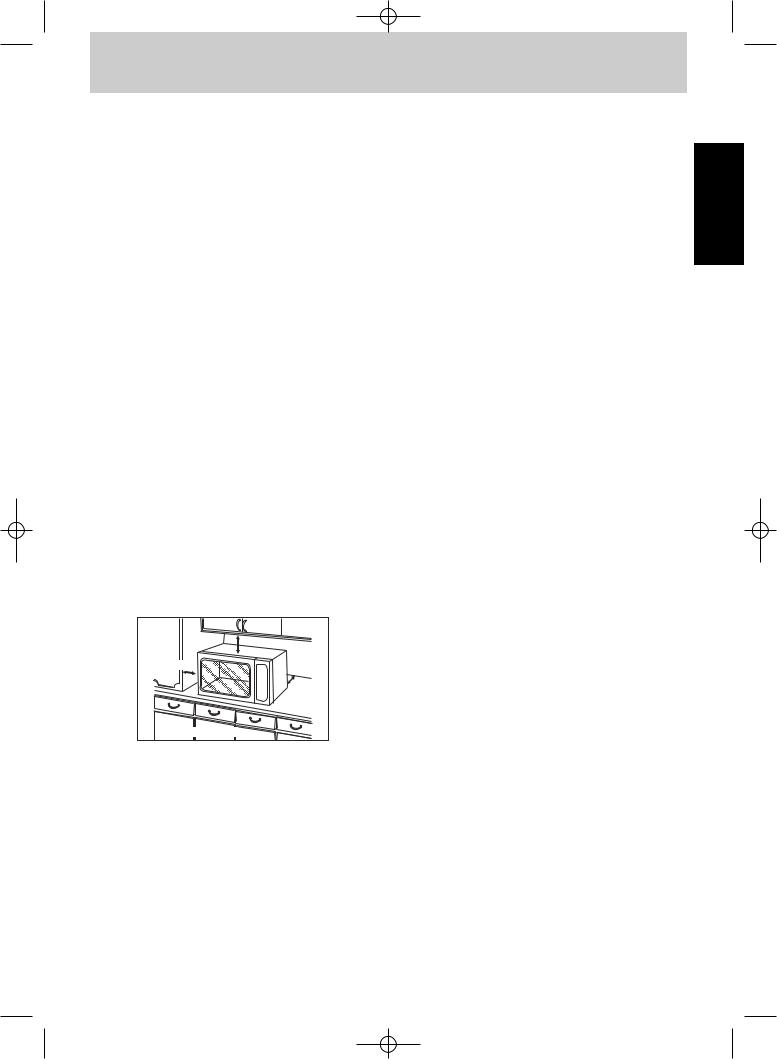
Installation and General Instructions
General Use
1.In order to maintain high quality, do not operate the oven when empty. The microwave energy will reflect continuously throughout the oven if no food or water is present to absorb energy.
2.If smoke is observed, press the STOP/RESET Pad or return "TIMER/WEIGHT SELECT DIAL" back to zero, and leave door closed. Disconnect the power cord, or shut off power at the fuse or circuit breaker panel.
3.Do not dry clothes, newspapers or other materials in oven. They may catch on fire.
4.Do not use recycled paper products, as they may contain impurities which may cause sparks and/or fires when used.
5.Do not use newspapers or paper bags for cooking.
6.Do not hit or strike control panel. Damage to controls may occur.
7.POT HOLDERS may be needed as heat from food is transferred to the cooking container and from the container to the glass tray. The glass tray can be very hot after removing the cooking container from the oven.
8.Do not store flammable materials next to, on top of, or in the oven. It could be a fire hazard.
9.Do not cook food directly on glass tray unless indicated in recipes. (Food should be placed in a suitable cooking utensil.)
10.DO NOT use this oven to heat chemicals or other nonfood products. DO NOT clean this oven with any product that is labeled as containing corrosive chemicals. The heating of corrosive chemicals in this oven may cause microwave radiation leaks.
11.If glass tray is hot, allow to cool before cleaning or placing in water.
Placement of Oven
1.The oven must be placed on a flat, stable surface. For correct operation, the oven must have sufficient air flow. Allow 15 cm of space on the top of the oven, 10 cm at back and 5 cm on both sides. If one side of the oven is placed flush to a wall, the other side or top must not be blocked. Do not remove feet.
15cm |
5cm |
10cm |
OPEN |
Counter-top |
(a)Do not block air vents. If they are blocked during operation, the oven may overheat. If the oven overheats, a thermal safety device will turn the oven off. The oven will remain inoperable until it has cooled.
(b)Do not place oven near a hot or damp surface such as a gas stove, electric range or sink etc.
(c)Do not operate oven when room humidity is too high.
2.This oven was manufactured for household use only.
Food
1.Do not use your oven for home canning or the heating of any closed jar. Pressure will build up and the jar may explode. In addition, the microwave oven cannot maintain the food at the correct canning temperature. Improperly canned food may spoil and be dangerous to consume.
2.Do not attempt to deep fat fry in your microwave oven.
3.Do not boil eggs in their shell (unless otherwise stated in cookbook). Pressure will build up and the eggs will explode.
4.Potatoes, apples, egg yolks, whole squash and sausages are examples of foods with nonporous skins. This type of food must be pierced before cooking, to prevent bursting.
5.When heating liquids, e.g. soup. sauces and beverages in your microwave oven, overheating the liquid beyond boiling point can occur without evidence of bubbling.
This could result in a sudden boil over the hot liquid. To prevent this possibility the following steps should be taken.
(a)Avoid using straight-sided containers with narrow necks.
(b)Do not overheat.
(c)Stir the liquid before placing the container in the oven and again halfway through cooking time.
(d)After heating, allow to stand in the oven for a short time, stirring again before carefully removing the container.
6.DO NOT USE A CONVENTIONAL MEAT THERMOMETER IN THE MICROWAVE OVEN. To check the degree of cooking of roasts and poultry use a MICROWAVE THERMOMETER. Alternatively, a conventional meat thermometer may be used after the food is removed from the oven. If undercooked, return meat or poultry to the oven and cook for a few more minutes at the recommended power level. It is important to ensure that meat and poultry are thoroughly cooked.
7.COOKING TIMES given in the cookbook are APPROXIMATE. Factors that may affect cooking time are preferred degree of moisture content, starting temperature, altitude, volume, size, shape of food and utensils used. As you become familiar with the oven, you will be able to adjust for these factors.
8.It is better to UNDERCOOK RATHER THAN OVERCOOK foods. If food is undercooked, it can always be returned to the oven for further cooking. If food is overcooked, nothing can be done. Always start with minimum cooking times recommended.
9.Extreme care should be taken when cooking popcorn in a microwave oven. Cook for minimum time as recommended by manufacturer. Use the directions suitable for the wattage of your microwave oven. NEVER leave oven unattended when popping popcorn.
10.When heating food in plastic or paper containers, check the oven frequently due to the possibility of ignition.
11.The contents of feeding bottles and baby food jars are to be stirred or shaken and the temperature is to be checked before consumption, in order to avoid burns.
Operating English
Instructions
- En-2 -
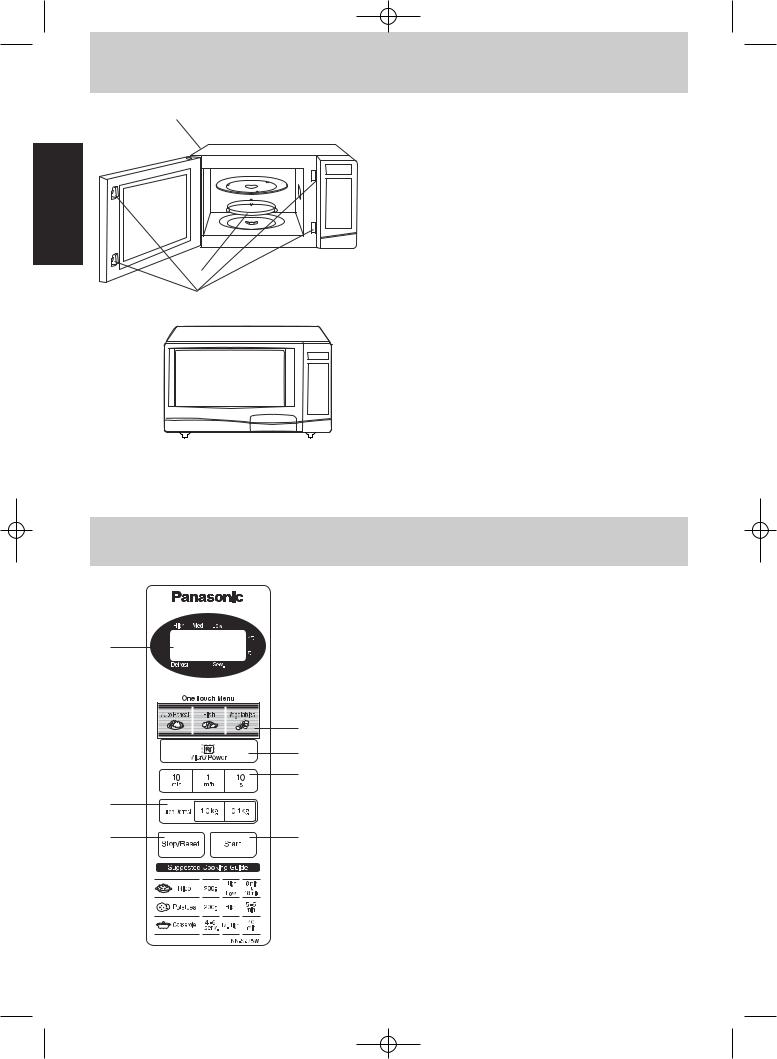
Instructions
English Cookbook
English Operating
Feature Diagram
8 |
9 |
7 5 |
|
|
|
|
|
1 |
Oven Window |
|||||
|
|
|
|
|
|
|
|
|
|
|
|
|
2 |
Door Safety Lock System |
|
|
|
|
|
|
|
|
|
|
|
|
|
3 |
Pull Door Handle |
|
|
|
|
|
|
|
|
|
|
|
|
|
|
Pull to open the door. Opening the door during cooking |
|
|
|
|
|
|
|
|
|
|
|
|
|
|
will stop the cooking process without cancelling the |
|
|
|
|
|
|
|
|
|
|
|
|
|
|
program. Cook resumes as soon as the door is closed |
|
|
|
|
|
|
|
|
|
|
|
|
|
|
and Start Pad is pressed. It is quite safe to open the |
|
|
|
|
|
|
|
|
|
|
|
|
|
|
door at any time during a cooking program and there is |
|
|
|
|
|
|
|
|
|
|
|
|
|
|
|
1 |
|
|
|
|
|
|
|
|
|
|
|
4 |
|
no risk of Microwave exposure. |
|
|
|
|
|
|
|
|
|
|
|
4 |
Control Panel |
||
|
|
|
|
|
|
|
|
|
|
|
|
|
5 |
Cover (do not remove) |
|
|
|
|
|
|
|
|
|
|
|
|
|
6 |
Roller Ring |
|
|
|
|
|
|
|
|
|
|
|
|
|
|
a. Roller Ring should be cleaned regularly to avoid |
|
|
|
|
|
|
|
|
|
|
|
|
|
|
excessive noise. |
|
6 |
|
|
|
|
|
|
|
|
|
|
|
b. Roller Ring and Glass Tray should be used at the |
|
|
2 |
|
|
|
|
|
|
|
|
|
|
|
same time. |
|
|
|
|
|
|
|
|
|
|
|
|
7 |
Identification Plate |
||
|
|
|
|
|
|
|
|
|
|
|
|
|
8 |
Oven Air Vent |
|
|
|
|
|
|
|
|
|
|
|
|
|
9 |
Glass Tray |
|
|
|
|
|
|
|
|
|
|
|
|
|
|
a. DO NOT operate the oven without the Roller Ring |
|
|
|
|
|
|
|
|
|
|
|
|
|
|
and Glass Tray in place. |
|
|
|
|
|
|
|
|
|
|
|
|
|
|
b. Only use the Glass Tray specifically designed for this |
|
|
|
|
|
|
|
|
|
|
|
|
|
|
oven. Do not substitute any other Glass Tray. |
|
|
|
|
|
|
|
|
|
|
|
|
|
|
c. If the Glass Tray is hot, allow to cool before cleaning |
|
|
|
|
|
|
|
|
|
|
|
|
|
|
or placing in water. |
|
|
|
|
|
|
|
|
|
|
|
|
|
|
d. DO NOT cook directly on the Glass Tray. Always |
|
|
|
|
|
|
|
|
|
|
|
|
|
|
place food on a microwave-safe dish, or on a rack set |
|
|
|
|
|
|
|
|
|
|
|
|
|
|
in a microwave-safe dish. |
|
|
|
|
|
|
|
|
|
|
|
|
|
|
e. If food or utensil on the Glass Tray touches oven |
|
|
|
|
|
|
|
|
|
|
|
|
|
|
|
|
|
|
|
|
|
|
|
|
|
|
|
|
|
walls, causing the tray to stop moving, the tray will |
|
|
|
|
|
|
|
|
|
|
|
|
|
|
automatically rotate in the opposite direction. This is |
|
|
|
|
3 |
|
|
|
|
|
|
|
|||
|
|
|
|
|
|
|
|
|
|
|
normal. |
|||
|
|
|
|
|
|
|
|
|
|
|
|
|
|
|
|
|
|
|
|
|
|
|
|
|
|
|
|
|
f. Glass Tray can rotate in either direction. |
Control Panel (NN-S235)
|
|
(1) |
Display Window |
|
|
|
(2) |
Turbo Defrost Pad |
|
|
|
(3) |
Auto Cook Pads |
|
|
|
(4) |
Micro Power Pad |
|
(1) |
|
(5) |
Time Pads |
|
|
(6) |
Stop/Reset Pad |
||
|
|
|
Before cooking: One tap clears your instruction. |
|
|
|
|
During cooking: One tap temporarily stops the cooking |
|
|
|
|
process. Another tap cancels all your instructions and |
|
|
|
(7) |
colon appears on the Display Window. |
|
|
|
Start Pad |
||
|
(3) |
|
One tap allows oven to begin functioning. If door is |
|
|
|
opened or Stop/Reset Pad is pressed once during oven |
||
|
|
|
||
|
(4) |
|
operation, Start Pad must be pressed again to restart |
|
|
|
oven. |
||
|
|
|
||
|
(5) |
Beep Sound: |
||
|
|
|||
(2) |
|
When a pad is pressed correctly, a beep will be heard. |
||
|
If a pad is pressed and no beep is heard, the unit did not or |
|||
|
|
cannot accept the instruction. The oven will beep twice |
||
(6) |
(7) |
between programmed stages. At the end of any complete |
||
program, the oven will beep 5 times. |
||||
|
|
|||
- En-3 -
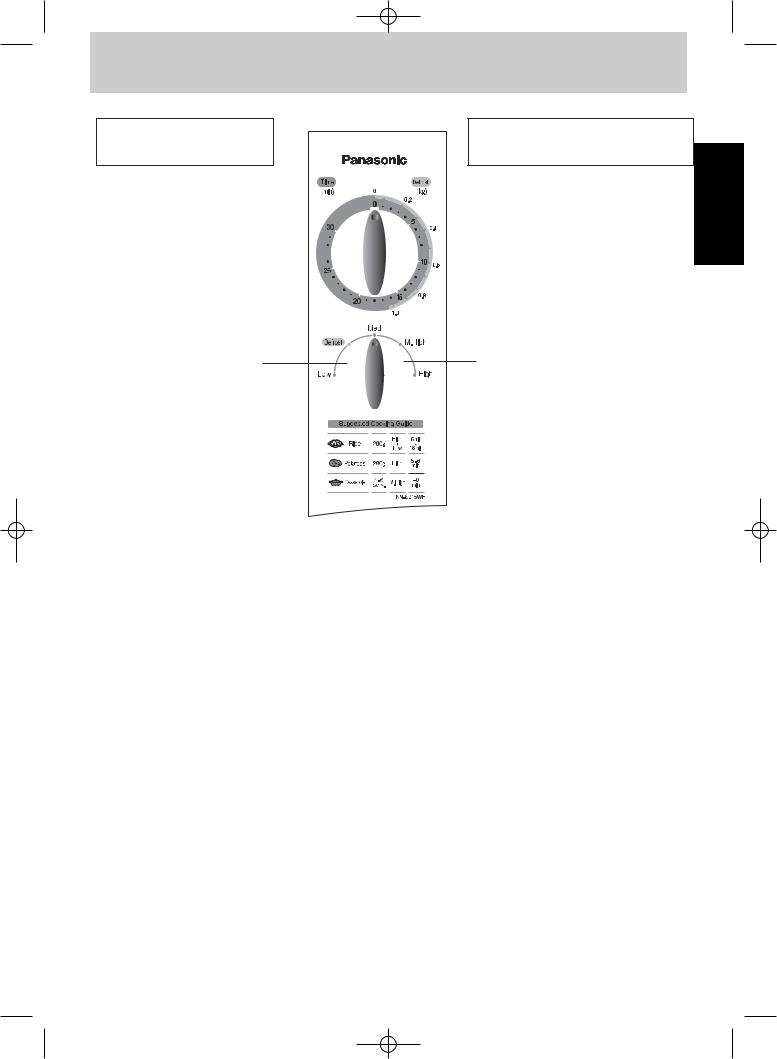
Operation (NN-S215)
To Set Cooking
Program
1.Put the food into the oven
3.Set Cooking Time 
NOTE: When selecting the time for shorter than 5 minutes, turn Timer/Weight Select Dial past 5 minutes and then return to the correct time.
2.Set the Power Level
To Defrost by Setting Weight of Food
1.Put the food into the oven
 3.Set the Weight of Food
3.Set the Weight of Food
NOTE: When selecting weight for less than 0.3 kg, turn Timer/Weight Select Dial past 0.3 kg and then return to correct weight.
2.Set the Power Level at
Defrost
Operating English
Instructions
Power Level |
Power |
Example of Use |
HIGH |
100% |
Boil water. Cook fresh fruit, vegetables, rice, pasta, noodles. |
|
|
|
MEDIUM-HIGH |
70% |
Cook poultry, meat, cakes, desserts and heat milk. |
|
|
|
MEDIUM |
55% |
Cook pot roasts, casseroles and meat loaves, melt chocolate. Cook eggs and cheeses. Cook fish. |
|
|
|
DEFROST |
30% |
Thaw foods. |
|
|
|
LOW |
10% |
Keep cooked foods warm, simmer slowly. |
|
|
|
NOTE:
1.As soon as the TIMER/WEIGHT SELECT DIAL is turned, the oven will start cooking the food.
2.ALWAYS RETURN TIMER/WEIGHT SELECT DIAL BACK TO "0" position if food is removed from oven before set cooking time is complete and when oven is not in use.
3.TO STOP OVEN when a cooking program is set, open the door—microwaves automatically stop entering the oven cavity because of the safety door lock system. If the remaining cooking time is not required, turn the Timer/Weight Select Dial back to "0" before closing the door.
4.You can refer to the Suggested Cooking Guide when cooking (please refer to page 8), of course you can use other power levels as desired.
- En-4 -
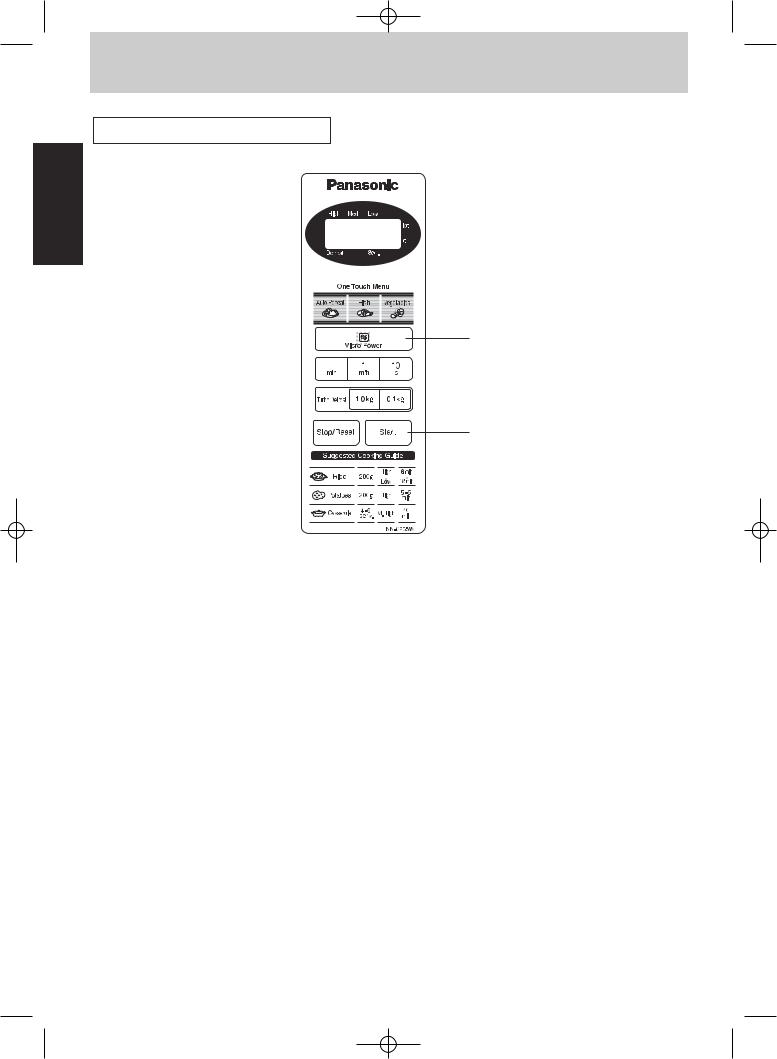
Operation (NN-S235)
To Set Power and Time:
CookbookOperating |
|
Instructions |
|
EnglishEnglish |
1.Put the food into the |
|
|
|
oven |
3.Set Cooking Time 

(HIGH |
up to |
30 minutes |
|
or 29 minutes 90 seconds |
|
Others |
up to |
99 minutes 90 seconds) |
2.Press to select power
(see chart below)
4.Press
The time on the Display Window will count down.
No. of taps |
Power Level |
Power |
Example of Use |
|
1 |
HIGH |
100% |
Boil water. Cook fresh fruit, vegetables, rice, pasta and noodles. |
|
|
|
|
|
|
2 |
DEFROST |
30% |
Thaw foods. |
|
|
|
|
|
|
3 |
MEDIUM-HIGH |
70% |
Cook poultry, meat, cakes, desserts, heat milk. |
|
|
|
|
|
|
4 |
MEDIUM |
55% |
Cook pot roasts, casseroles and meat loaves, melt chocolate. |
|
Cook eggs and cheeses. Cook fish. |
||||
|
|
|
||
|
|
|
|
|
5 |
LOW |
10% |
Keep cooked foods warm, simmer slowly. |
|
|
|
|
|
NOTE:
1.For 2 or 3 stage cooking, repeat steps 2 and 3 above before pressing Start pad.
2.When selecting High power on the first stage, you can skip step 2.
3.You can refer to the Suggested Cooking Guide when cooking (please refer to page 8), of course you can use other power levels as desired.
- En-5 -
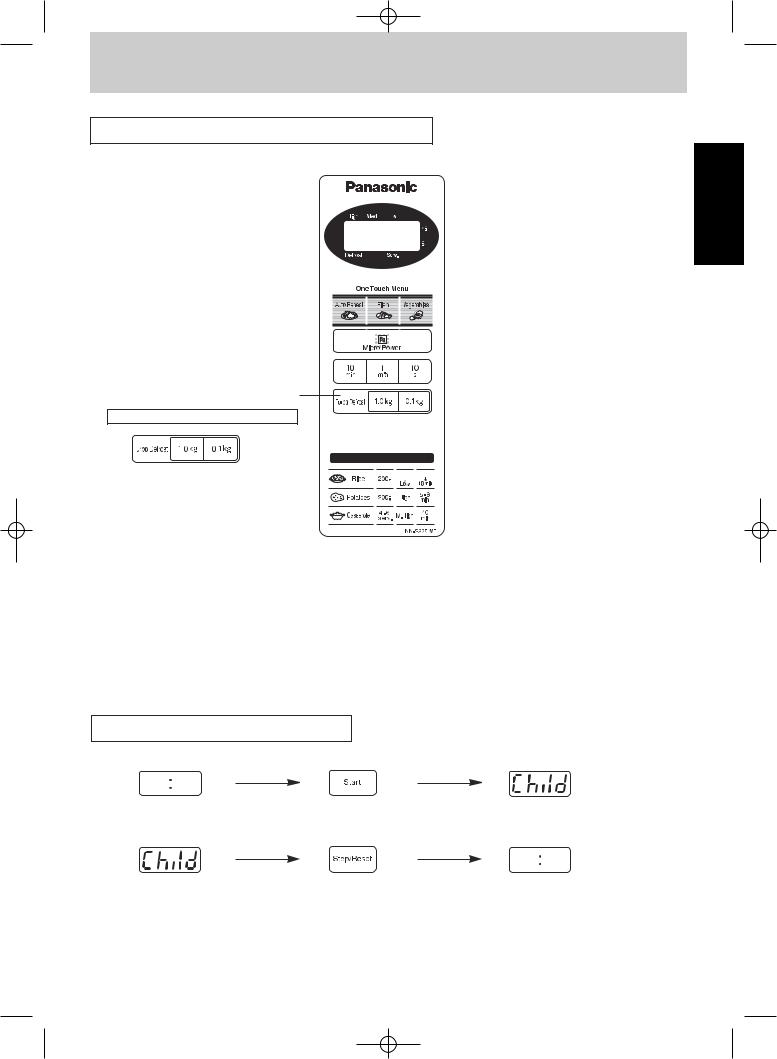
Operation (NN-S235) |
(continued) |
To Use Turbo Defrost (0.1~2.0 kg):
1.Put the food into the oven
2.Select the weight of food
Example: To defrost 1.5 kg of meat.
 3.Press
3.Press
Defrosting time appears on the Display











 Window and begings to count down, once 5 times
Window and begings to count down, once 5 times 



Food |
Maximum |
|
Weight |
||
|
||
Minced meat, Chicken Pieces, |
2 kg |
|
Chops |
||
|
||
|
|
|
Beef roast, lamb, whole |
2 kg |
|
chickens |
||
|
||
|
|
|
Whole fish, scallops, prawns, |
1 kg |
|
fish fillets |
||
|
NOTE:
1.Turbo Defrost can be used to defrost many cuts of meat, poultry and fish by weight. To use, simply program Turbo Defrost and the weight of the food in kg (1.0) and tenths of a kg (0.1). The oven will determine the defrosting time and power levels. Once the oven is programmed, the defrosting time will appear in the display. For best results the minimum recommended weight is 0.2 kg.
2.BONE-IN ROASTS, such as a Beef Rib Roast have a smaller muscle than a boneless roast of the same weight. Therefore, for bone-in roasts weighing over 2 kg reduce weight by 500 g. For bone-in roasts weighing less than 2 kg, reduce weight by 250 g.
3.Turn over or remove or shield food when buzzer rings in the middle of cooking.
To Use Child Safety Lock:
To set:
Operating English
Instructions
Colon is displayed |
Press 3 times |
Display Window |
To cancel:
Display Window |
Press 3 times |
Colon is displayed |
NOTE:
1.Child Lock can be set when colon is displayed.
2.This feature allows you to prevent operation of the oven by a young child; however, the door will open.
-En-6 -
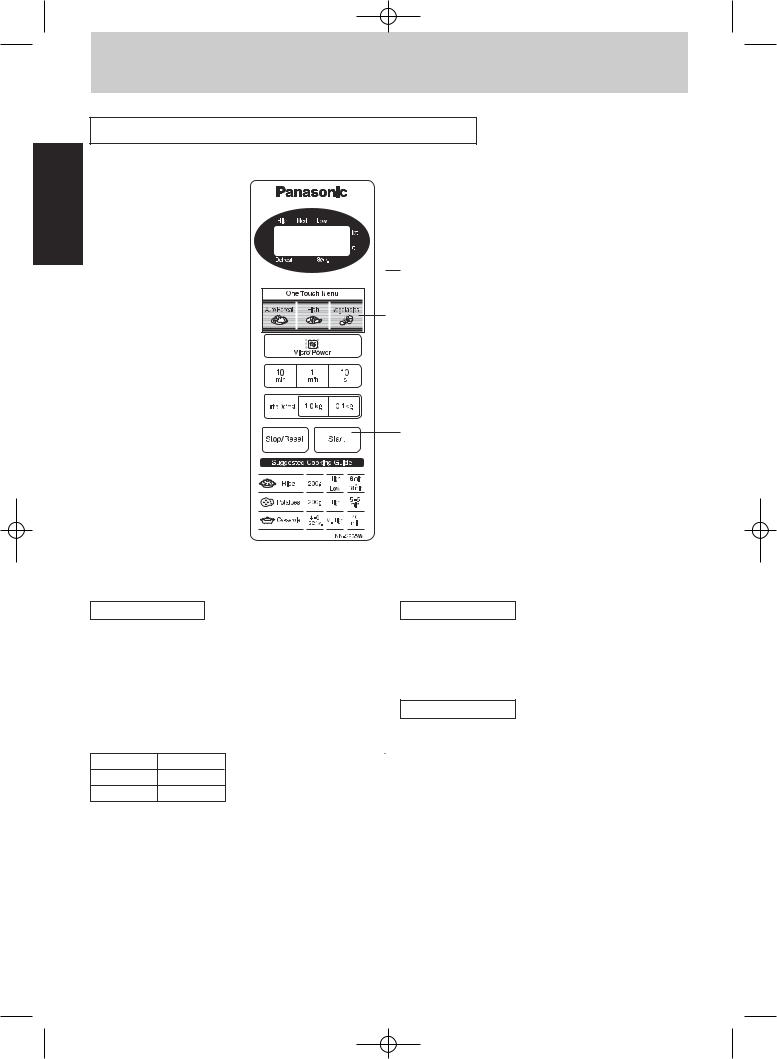
Instructions
English Cookbook
English Operating
Operation (NN-S235) |
(continued) |
To Reheat/Cook using Auto Cook Pads:
1.Put the food into the oven
2.Select pads
Press the desired food category pad until the desired number of Weight appears on the Display Window.
Pads |
1 tap |
2 taps |
3 taps |
Auto Reheat |
1 serve |
2 serves |
3 serves |
Vegetables |
100 g |
200 g |
300 g |
Fish |
100 g |
200 g |
300 g |
3.Press
The time on the Display Window will count down.
Auto Reheat
Pre-cooked foods are reheated automatically by setting the food's serving. You need not select power level or reheating time. The foods should be at refrigerator or room temperature. Use suitable sized dish and cover with a lid or microwave safe plastic.
Note: When reheating items such as soups, stews, and casseroles, it is recommended that they are stirred at half of reheating time and at completion of reheating.
Average serving size
1 serve |
200 g |
2 serves |
400 g |
3 serves |
600 g |
Vegetables
It is suitable steaming leafy vegetables only. Arrange vegetables on a plate or casserole dish, stem on outer ring of plate and leafy in the center. Cover with a lid or microwave safe plastic wrap.
Fish
It is suitable for steaming all types of fish. Arrange fish in a layer in a shallow microwave safe dish and cover with a lid or microwave safe plastic wrap. Always ensure fish is slit lengthwise, cut into slices or in fillets to promote even cooking (thickness of fish should not be more than 3 cm).
- En-7 -

Suggested Cooking Guide
Rice
•Place rice with water in a suitable sized dish. Use the following as a guide:
Rice |
*Water |
Dish Size |
Cooking Time |
|
200 g |
500 ml |
3 litre |
HIGH 6 mins |
|
(1 cup) |
(2 cups) |
LOW 18 mins |
||
|
||||
|
|
|
|
*(It may be necessary to adjust the amount of water to your personal preference.)
•Rice will boil over if the dish used is too small.
•Cook rice covered with lid or plastic wrap.
•Do not cook in plastic containers unless suitable for high temperature cooking.
•Stand rice for 5 to 10 minutes after cooking, if necessary.
Casserole
•Cut meat and vegetables into even size pieces.
•Place in a suitable sized dish. Dish should be approximately 3/4 full.
•Do not use plastic dishes as incorrect cooking time may result.
•Add 1/2 to 1 cup of soup, broth or stock per 500 g of meat.
•Cover securely with plastic wrap or a well fitting lid.
•Halfway through the cooking time, stir.
•At the end of cooking time, allow the casserole to stand for 5 to 10 minutes.
•When cooking the volume of 3/4 full of 3-litre casserole dish, suggested cooking time is 30 to 40 minutes on MEDIUM-HIGH.
Potatoes
•Potatoes should be trimmed or prepared and cut into evenly sliced pieces.
•Add 1 tablespoon to 1/4 cup of water to vegetables, if dehydrated or softer texture is desired.
•Place in a appropriate size dish and cover with plastic wrap or well fitting lid.
•Halfway through the cooking time, stir potatoes. This will assist in even cooking.
•Use the following as a guide:
Weight |
Power |
Cooking Time |
|
|
|
200 g |
HIGH |
5 - 6 mins |
500 g |
HIGH |
8 - 9 mins |
|
|
|
Operating English
Instructions
- En-8 -
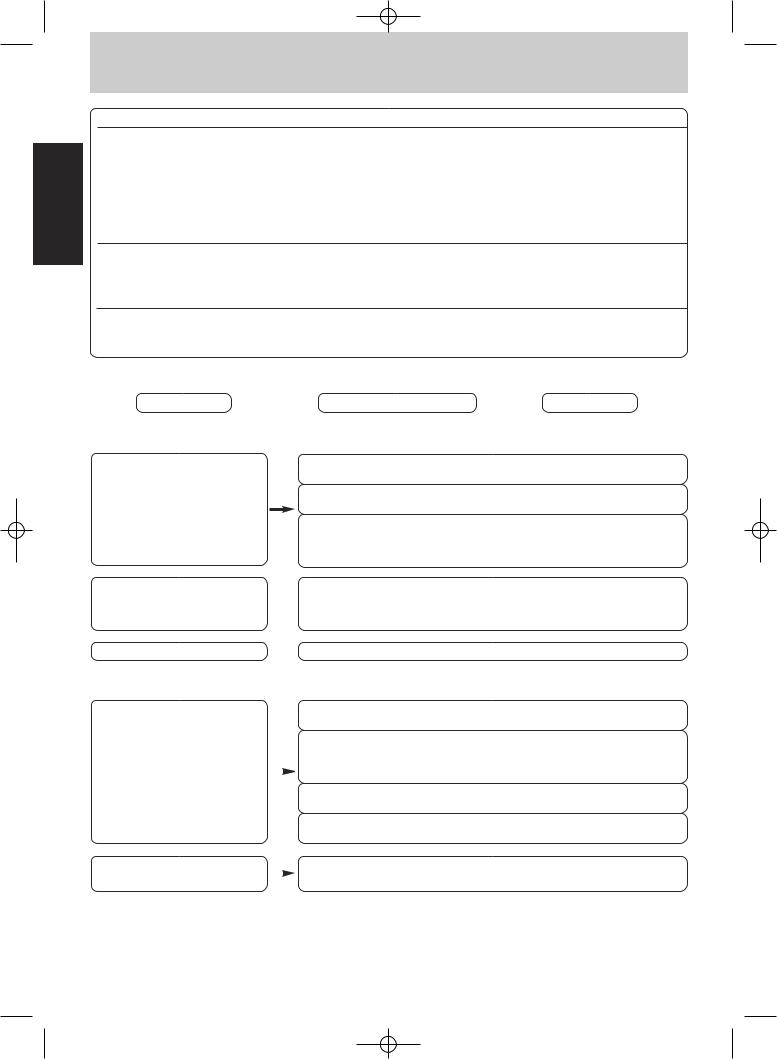
Instructions
English Cookbook
English Operating
Before Requesting Service
ALL THESE THINGS ARE NORMAL:
The oven causes interference |
Some radio and TV interference might occur when you cook with the |
with my TV. |
microwave oven. This interference is similar to the interference caused by |
|
small appliances such as mixers, vacuums, hair dryers, etc. It does not |
|
indicate a problem with your oven. |
|
|
The oven lights dim. |
When cooking with a power other than HIGH, the oven must cycle to obtain |
|
the lower power levels. The oven light will dim and clicking noises can be |
|
heard when the oven cycles. |
Steam accumulates on the oven |
During cooking, steam and warm air are given off from the food. Most of |
door and warm air comes from |
the steam and warm air are removed from the oven by the air which |
the oven vents. |
circulates in the oven cavity. However, some steam will condense on cooler |
|
surfaces such as the oven door. This is normal. |
I accidentally operate my |
Operating the oven empty for a short time will not damage the oven. |
microwave oven without any |
However, we do not recommend this to be done. |
food in it. |
|
PROBLEM |
POSSIBLE CAUSE |
REMEDY |
For All models:
Oven will not turn on.
When the oven is turning on, there is noise coming from Glass Tray.
Oven will not start cooking.
For NN-S235 only:
The oven is not plugged in securely.
Circuit breaker or fuse is tripped or blown.
There is a problem with the outlet.
The roller ring and oven bottom  are dirty.
are dirty.
 The door is not closed completely.
The door is not closed completely.
Start Pad was not pressed after programming.
Remove plug from outlet, wait 10 seconds and re-insert.
Reset circuit breaker or replace fuse.
Plug another appliance into the outlet to check if the outlet is working.
Clean these parts according to care of your oven (See next page).
Close the oven door securely.
Press Start Pad.
|
|
|
Another program has already |
Press Stop/Reset Pad to cancel |
|
|
|
been entered into the oven. |
the previous program and program |
Oven will not start cooking. |
|
|
|
again. |
|
|
|
||
|
|
|
The program has not been |
Program again according to the |
|
|
|
entered correctly. |
Operating Instructions. |
|
|
|
Stop/Reset Pad has been |
Program oven again. |
|
|
|
pressed accidentally. |
|
The word "Child" appears in |
|
|
The Child Lock was activated by |
Deactivate Lock by pressing |
the Display Window. |
|
|
pressing Start Pad 3 times. |
Stop/Reset Pad 3 times. |
If it seems there is a problem with the oven, contact an authorized Service Centre.
- En-9 -

Care of your Microwave Oven
1.Turn the oven off and remove the power plug from the wall socket before cleaning.
2.Keep the inside of the oven clean. When food splatters or spilled liquids adhere to oven walls, wipe with a damp cloth. Mild detergent may be used if the oven gets very dirty. The use of harsh detergent or abrasives is not recommended.
3.The outside oven surfaces should be cleaned with a damp cloth. To prevent damage to the operating parts inside the oven, water should not be allowed to seep into the ventilation openings.
4.Do not allow the Control Panel to become wet. Clean with a soft, damp cloth. Do not use detergents, abrasives or spray-on cleaners on the Control Panel.
When cleaning the Control Panel, leave oven door open to prevent oven from accidentally turning on. After cleaning press STOP/RESET Pad to clear display window or make sure TIMER/WEIGHT SELECT DIAL is set to zero position.
5.If steam accumulates inside or around the outside of the oven door, wipe with a soft cloth. This may occur when the microwave oven is operated under high humidity conditions and in no way indicates malfunction of the unit.
6.It is occasionally necessary to remove the glass tray for cleaning. Wash the tray in warm sudsy water or in a dishwasher.
7.The roller ring and oven cavity floor should be cleaned regularly to avoid excessive noise. Simply wipe the bottom surface of the oven with mild detergent, water or window cleaner and dry. The roller ring may be washed in mild sudsy water or dish washer. Cooking vapors collect during repeated use but in no way affect the bottom surface or roller ring wheels. When removing the roller ring from cavity floor for cleaning, be sure to replace in the proper position.
8.When it becomes necessary to replace the oven light, please consult a dealer to have it replaced.
9.Failure to maintain the oven in a clean condition couid lead to deterioration of the surface that could adversely affect the life of the appliance and possibly result in a hazardous situation.
Technical Specifications
|
220 V |
|
220 V |
240 V |
|
|
|
|
|
|
|
Power Source |
50 Hz |
50 Hz |
|
60 Hz |
50 Hz |
|
|
|
|
|
|
Power Consumption |
5.9 A 1,200 W |
5.4 A 1,100 W |
|
7.3 A 1,500 W |
5.4 A 1,200 W |
|
|
|
|
|
|
Cooking Power* |
|
|
800 W |
|
|
Outside Dimensions (H x W x D) |
|
284 mm x 482 mm x 364 mm |
|
||
Oven Cavity Dimensions (H x W x D) |
|
218 mm x 325 mm x 330 mm |
|
||
|
|
|
|
|
|
Operating Frequency |
|
2,450 MHz |
|
||
|
|
|
|
|
|
Net Weight |
|
Approx. 11.0 kg |
|
||
|
|
|
|
|
|
* IEC Test Procedure
Specifications subject to change without notice.
As for the voltage requirement, the production month, country and serial number, please refer to the identification plate on the microwave oven.
Operating English
Instructions
- En-10 -

Introduction
English Cookbook
Cooking with Microwave Energy
Microwaves are a form of high frequency electromagnetic waves (approx 12cm wavelength) similar to those used by a radio. Electricity is converted into microwave energy by the magnetron tube. The microwaves travel from the magnetron tube to the oven cavity where they are reflected, transmitted or absorbed.
Reflection
Microwaves are reflected by metal just as a ball is bounced off a wall. A combination of stationary (interior walls) and rotating metal (turntable or stirrer fan) helps assure that the microwaves are well distributed within the oven cavity to produce even cooking.
Transmission
Microwaves pass through some materials such as paper, glass and plastic much like sunlight shining through a window. Because these substances do not absorb or reflect the microwave energy, they are ideal materials for microwave oven cooking containers.
Absorption
Microwaves are absorbed by food. They penetrate to a depth of about 2 to 4cm. Microwave energy excites the molecules in the food (especially water, fat and sugar molecules), and causes them to vibrate very quickly. The vibration causes friction and heat is produced. In large foods, the heat which is produced by friction is conducted to the center to finish cooking.
Cookware and Utensil Guide
|
Microwave Oven |
|
|
Aluminuim Foil |
For Shielding |
Grill Tray |
No |
Browning Dish |
Yes |
Browning Paper Bags |
No |
Dinnerware: Oven/Microwave Safe |
Yes |
Non Oven/Microwave Safe |
No |
Disposable Polyeser |
Yes |
Paperboard Dishes |
|
Glassware: Oven Glassware & Ceramic |
Yes |
Non-heat Resistant |
No |
Metal Cookware |
No |
Metal Twist-ties |
No |
Oven Cooking Bag |
Yes |
Oven Rack |
No |
Paper Towels and Napkins |
Yes |
Plastic Dishes: Microwave Safe |
Yes |
Non-microwave Safe |
No |
Plastic Wrap |
Yes |
Straw, Wicker, Wood |
Yes |
Thermometers: Microwave Safe |
Yes |
Conventional |
No |
Wax Paper |
Yes |
- En-11 -
